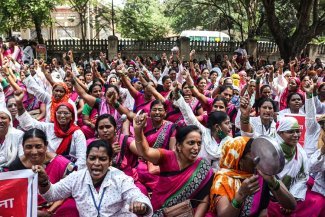Last month, Burkina Faso – a name which roughly translates as “land of incorruptible people” –surprised the world with a popular uprising that brought an end, within a matter of days, to the regime of President Blaise Compaoré, who has been in power since 1987.
As political negotiations take place under the auspices of the African Union (AU), the Economic Community of West African States (ECOWAS) and the United Nations, Burkinabé workers are hoping that the change in regime, to which they actively contributed, heralds better living and working conditions.
The expectations held by Burkina Faso’s main trade union centres are wholly legitimate, given their role in the demonstrations that led the former regime to resign on 31 October 2014.
Just 48 hours prior to the fall of Blaise Compaoré, the National Coalition against the High Cost of Living (CCVC) held a national day of action calling for quality education.
It took place on 29 October, the day before the Burkinabé parliament was scheduled to vote on the infamous law to amend the constitution that would have allowed the former president to remain in power.
Burkina Faso’s workers’ organisations have always ascribed to the need for a change in the country’s political and socioeconomic system.
In addition, despite the fears and uncertainty linked to the risk of seeing the military seize power, workers from the public and private sector also deserve credit for their part in the “people’s revolution” in October.
The vast majority of the trade union movement in Burkina Faso is against the military taking power and supports a return to constitutional order and a political transition headed by a civil society representative.
It is a position shared with the parties opposed to the former regime.
The workers’ priorities
Zata Nana, a teacher in one of the public schools in Ouagadougou, Burkina Faso’s capital city, does not hide her optimism.
For her, the political transition raises “hope rather than fear”.
She is confident that “once this difficult period is over, the new authorities will address the high cost of living issue. The solution brought to the problem of workers’ purchasing power would be a good barometer of the change in regime in Burkina Faso.”
The Confédération Nationale des Travailleurs du Burkina (CNTB) is of the same opinion.
For its general secretary, Blaise Augustin Hien, three key issues need to be addressed to secure the changes hoped for, which are “the fight against poverty, the reduction of social inequalities and the resolution of the issue of young people’s employability”.
He is convinced that the success of the popular uprising between 28 and 31 October is owed to the courage of Burkina Faso’s young people and that they should be shown justice by urgently tackling issues such as access to quality education, decent work and health care.
The same hopes are shared by Joseph Tiendrébéogo, general secretary of the Union Nationale du Syndicat Libre/Forces Ouvrières (UNSL/FO) and president of the Centrales Syndicales du Burkina (CSB), who also insists that the new transitional authorities and those subsequently elected must take every action to guarantee trade union rights and freedoms.
As regards the social commitments the country’s future leaders should honour, they will not have far to look.
“All they need to do is to refer to the list of grievances that has been on the table of the (former) regime since 2012,” says Tiendrébéogo.
The demands include a 30 per cent pay rise for public and private sectors workers.









